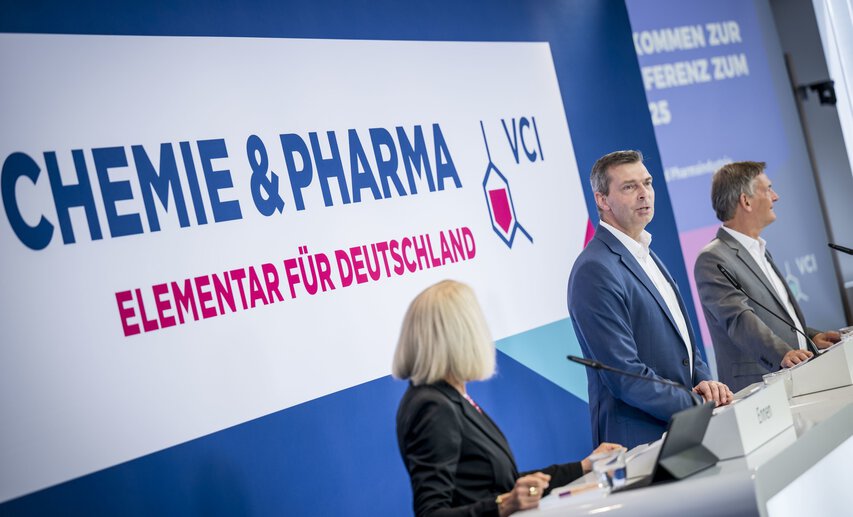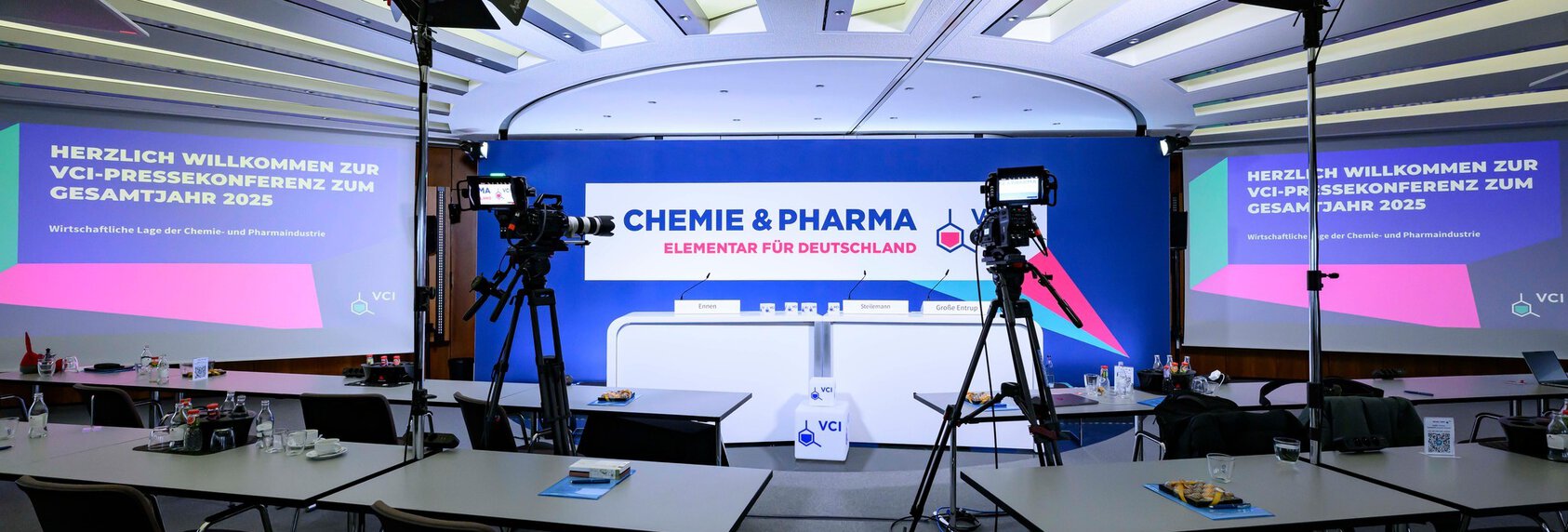17 July 2024 | Pressemitteilung
LanguageDEThe chemical-pharmaceutical industry has presented its half-year results for 2025.

- Production slightly down by 1 percent
- Total sales drop by 0.5 percent against previous year
- Stagnating producer prices
- Employment figures are stable at ca. 480.000 persons
- Outlook: no growth in 2025
In the 1st half of 2025, the chemical-pharmaceutical industry stopped the rapid downtrend of earlier years – irrespective of adverse geopolitical and economic factors. All the same, the business situation remains challenging. Companies are not expecting an upswing before 2026.
Production in the industry was slightly down compared with the previous year. A closer look shows that pharmaceuticals are making progress (+ 2 percent), while chemicals are lagging behind visibly (- 3 percent). The pharmaceutical sector is also ahead in terms of sales (+ 5 percent), with a weakly chemicals sector (- 2 percent). Overall, there was a minor drop (- 0.5 percent) in the industry’s sales in the 1st half of 2025. Employment figures are stable up until now. The problem is that a significant number of companies have already announced plant closures and staff cuts.
VCI President Markus Steilemann comments: “The situation remains tense. In the first half-year, our industry produced around 15 percent less than in the pre-crisis year of 2018. We are also seeing a double-digit decline in other important sectors of the economy. No trend reversal is emerging in our industry in 2025.”
The lack of orders persists as a major problem for the chemical-pharmaceutical industry. According to a recent survey by the association, well over 40 percent of VCI member companies are complaining about this. Capacity utilisation of production plants is at 80 percent and thus below the profitability threshold – already in the third consecutive year. It is becoming increasingly difficult to produce competitively. This is reflected in the industry’s trade balance too. Chemical exports are below the last year’s level while imports have gone up by 2 percent.
“Now, we need to join forces to act quickly and move forward boldly,” says Markus Steilemann. He emphasizes: “The business location Germany is overly expensive in an international comparison.” This is confirmed by VCI member companies: For the above, they blame excessive bureaucracy, too high taxes, non-competitive energy prices, immense labour costs and high raw material prices. Against this backdrop, most companies are also postponing urgently needed investments.
No improvement is in sight in the medium run. Germany is struggling with the third recession in a row. Neither the economic institutes nor the majority of VCI member companies are expecting an economic upswing in the 2nd half of 2025. Production shutdowns and investment shifts abroad are already a reality. Moreover, the number of insolvencies in the industry is rising.
A reason for confidence is that two out of three companies from the chemical-pharmaceutical industry are willing to invest again if location conditions improve in Germany and Europe. Steilemann sums up: “The industry is ready, politicians must deliver.”
A rethinking is felt in Berlin and Brussels. “Competitiveness, resilience and bureaucracy reduction are back at the top of the political agenda,” so the VCI President. With its immediate action programme, the new coalition government has taken a first important step towards tackling obstacles for the economy. In its coalition agreement, the federal government sets the goal of making Germany the leading place for chemicals, pharmaceuticals and biotechnology. Markus Steilemann welcomes the said approach: “Let’s work together on a powerful chemicals agenda – a masterplan that could become a blueprint for an overall industrial policy strategy.”
From the VCI’s perspective, five fields of action are decisive for this:
1. Consistent bureaucracy reduction: According to the ifo institute, Germany’s national economy loses 146 billion euros annually due to excessive red tape. For 88 percent of VCI member companies, the bureaucratic jungle is by far the biggest location problem in Germany – ahead of taxes or, for example, the skills shortage.
2. Modernize the brake on debt and give priority to investment: To avoid a fiscal sustainability gap, public spending must not go beyond the level of inter-generational fairness. Investments of the future should take precedence over consumption of the present. The economic turnaround can only succeed if the special fund is transferred into sustainable growth.
3. Bring the energy transition in a successful design: The energy transition should not fail due to its own ambitions. The announced monitoring report of the economics ministry must make the basis for setting the course. Energy policy needs to recreate the balance between security of supply, climate protection and affordability. The focus must be on optimising total electricity costs.
4. Strengthen resilience and innovation: Give emphasis on an industrial policy that supports forward-looking technologies. Resilience stems from diversification: building blocks are the EU-Mercosur agreement and an agreement in principle with the USA. At the same time, protection mechanisms are needed against unfair competition.
5. Seize the opportunities of the EU: A capital market and banking union could bundle economic forces, mobilize investments and establish Europe as a global centre of finance. The starting position is right: 450 million EU citizens and over 15 trillion euros in annual economic output.
Photos from the press conference are available from 12.00 noon at this link: https://vci.canto.de/v/VCIHalbjahresPkPresse.
The VCI and its sector associations represent the interests of around 2,300 companies from the chemical-pharmaceutical industry and related sectors vis-à-vis politicians, public authorities, other industries, science and media. In 2024, the VCI member companies realised sales of ca. 240 billion euros and employed more than 560,000 staff. Contact: VCI Press Department, phone: +49 69 2556-1496, e-mail:
presse@vci.de
VCI on X
Downloads
-
Key Figures
PDF | 134 kB | Version as of: 08 July 2024
Contact
For questions or suggestions, please feel free to contact us.

Arne Hübner
Pressesprecher Chemikalienpolitik, Handelspolitik und Wirtschaft
- Phone: +49 69 2556-1489
- E-mail: arne.huebner@vci.de
